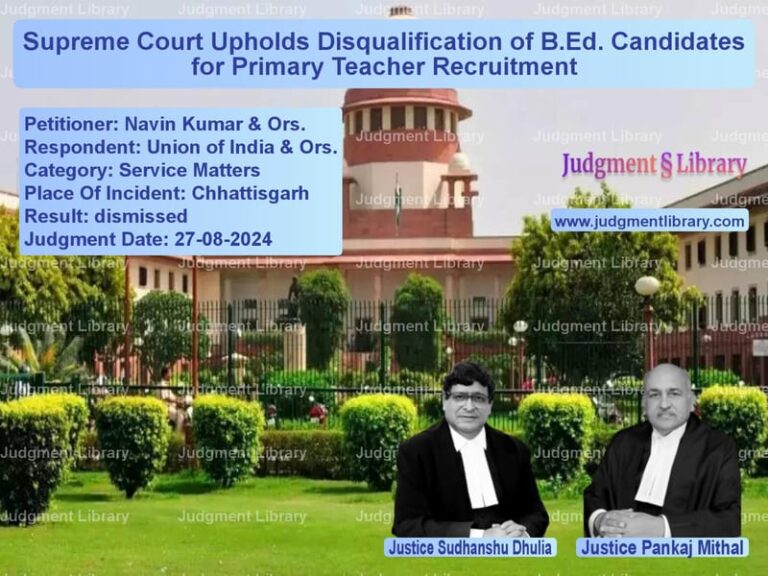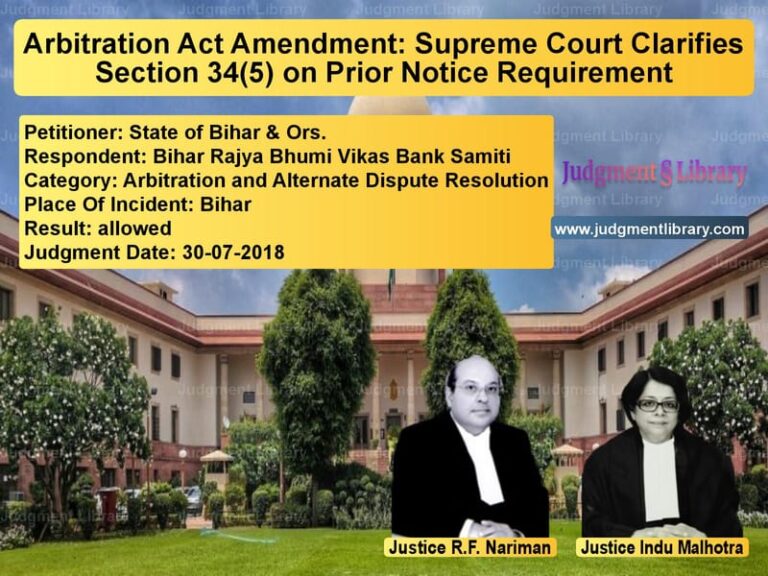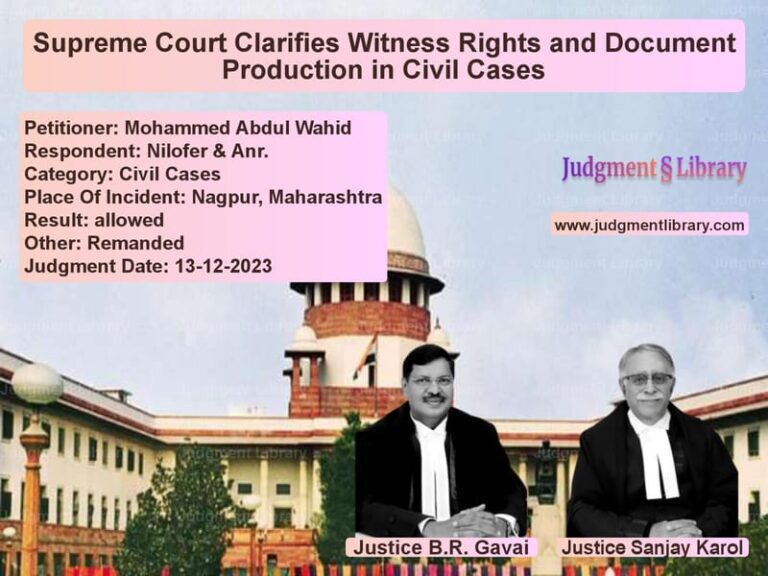Supreme Court Restores Bail of Purushothaman: High Court’s Order Quashed
The case of Purushothaman vs. State of Tamil Nadu involved a significant ruling by the Supreme Court on the issue of bail cancellation. The appellant, Purushothaman, was convicted under Section 6 of the Protection of Children from Sexual Offences Act, 2012 (POCSO Act). The High Court had earlier granted him bail in 2018 but later canceled it on the sole ground that his lawyer sought an adjournment. The Supreme Court ruled that such a decision violated the fundamental principles of justice.
Background of the Case
The appellant, Purushothaman, was convicted by the Trial Court for offenses under the POCSO Act. Upon filing an appeal, the High Court admitted the appeal and suspended his sentence in January 2018, granting him bail. However, in July 2023, when the appeal was scheduled for hearing, his advocate sought a four-week adjournment. The High Court, without hearing the appellant, canceled his bail solely on the ground that he was enjoying the facility of bail and his advocate sought an adjournment.
Arguments by the Petitioner – Purushothaman
The petitioner’s counsel presented the following arguments:
- The High Court unjustly canceled the bail without affording the appellant a hearing.
- Under Section 389(1) of the Code of Criminal Procedure (CrPC), an appellate court can suspend a sentence and grant bail, but the second proviso allows the Public Prosecutor to apply for cancellation. No such application was filed.
- The appellant cannot be penalized for his advocate’s request for adjournment.
- The High Court could have adopted alternative measures, such as appointing an amicus curiae or deciding the appeal on merits, rather than canceling bail.
Arguments by the Respondent – State of Tamil Nadu
The State argued:
- The High Court has the power to cancel bail if it finds that the appellant is misusing his liberty.
- Repeated adjournments can lead to prolonged trials, affecting justice delivery.
- The High Court acted within its discretion in canceling bail as the appellant was out of custody for years.
Supreme Court’s Key Observations
The Supreme Court ruled in favor of the appellant, making the following significant observations:
- Right to be Heard: “Under no circumstances, the bail granted to an accused under sub-section (1) of Section 389 can be canceled without giving a reasonable opportunity to the accused of being heard.”
- Alternative Remedies Available: The Court referred to the precedent set in Bani Singh v. State of U.P., stating that the High Court could have appointed another lawyer to argue the appeal rather than canceling bail.
- Distinguishing Between Adjournments and Bail Cancellation: The High Court was well within its rights to refuse an adjournment but should not have taken the extreme step of canceling bail.
- Legal Framework for Bail Cancellation: The Court reiterated that cancellation of bail should be governed by due process, as outlined in Section 389 of the CrPC.
Supreme Court’s Final Ruling
The Supreme Court set aside the High Court’s order canceling bail and restored the appellant’s previous bail order from January 12, 2018. However, the Court made it clear that if the appellant seeks further adjournments on unreasonable grounds, the High Court may proceed with the appeal by appointing a lawyer or deciding the case on its merits.
Conclusion
The Supreme Court’s ruling reinforces the fundamental principle that bail cancellation must follow due process and cannot be arbitrary. It establishes a precedent that courts must explore alternative solutions before taking drastic actions like canceling bail, ensuring that an accused’s right to be heard is always upheld.
Petitioner Name: Purushothaman.Respondent Name: State of Tamil Nadu.Judgment By: Justice Abhay S. Oka, Justice Pankaj Mithal.Place Of Incident: Tamil Nadu.Judgment Date: 30-10-2023.
Don’t miss out on the full details! Download the complete judgment in PDF format below and gain valuable insights instantly!
Download Judgment: purushothaman-vs-state-of-tamil-nadu-supreme-court-of-india-judgment-dated-30-10-2023.pdf
Directly Download Judgment: Directly download this Judgment
See all petitions in Bail and Anticipatory Bail
See all petitions in Judgment by Abhay S. Oka
See all petitions in Judgment by Pankaj Mithal
See all petitions in allowed
See all petitions in Quashed
See all petitions in supreme court of India judgments October 2023
See all petitions in 2023 judgments
See all posts in Criminal Cases Category
See all allowed petitions in Criminal Cases Category
See all Dismissed petitions in Criminal Cases Category
See all partially allowed petitions in Criminal Cases Category







